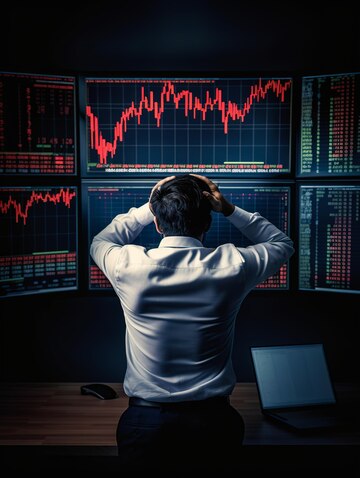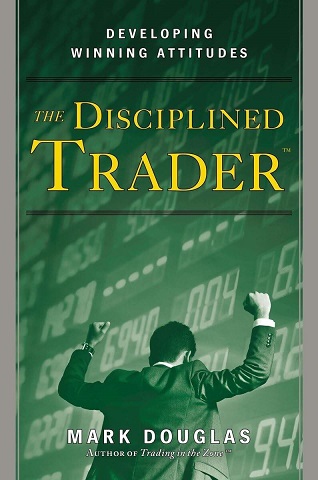
In the hustling streets of Mumbai, lived an ambitious trader named ‘Tanay’.
He was armed and loaded with all the trading skills.
Be it technical analysis, charts, candlestick patterns, indicators, or risk and money management – he knew them all.
Stocks often moved exactly as he analyzed. His levels were so precise, that the stock would fly and fall as soon as it came close to his markings.
He’d also spot great trade setups with perfect risk-reward ratios.
But when it came to executing trades, he couldn’t press that buy or sell button with his shivering hands.
Out of hesitation, he either acted too early or too late at times, missing several money-making opportunities.
Despite everything being in place, he still incurred losses unknowingly.
Do you know why? Because of the devil called – “FEAR”.
Fear of incurring losses or missing out on a trade (FOMO).
And this fear didn’t just dominate his mind during times of loss, but even during profits.
As soon as he saw even a slight profit, he would quickly book it due to anxiety.
He would be in profit by morning, but due to excessive greed, he would end up in losses again before the markets closed.
Furthermore, the losses became even bigger when he began revenge trading in an attempt to recover them.
So, what was going wrong here? After mastering trading skills, why couldn’t he become a profitable trader?
It was his psychology. It was his mindset and psychology that was pulling him down.
What is Trading Psychology?

“If you cannot control your emotions, you cannot control your money”. -Warren Buffet.
Trading Psychology refers to the mental and emotional factors that influence a trader’s decisions and behaviours in the markets.
In short, ‘It is the mindset and beliefs a trader is trading with’.
Trading psychology is often associated with emotions that interfere with a trader’s mind while trading.
Such a roller-coaster of emotions often leads to impulsive decisions.
So, it is important to be aware of your emotions and mental state while trading, as they can impact your decisions.
Understanding your emotional state can help you make better and more sensible trading decisions.
Why Trading Psychology is Important?

“Trade only in 2 conditions: (1) When the Market is ready (favourable). (2) When YOU’RE READY”. Read that again.
Trading and the stock market are not just about charts, patterns, candlesticks, numbers, etc.
Your psychology is one of the most important quadrants of trading.
Without stable psychology and emotional control, all other quadrants of trading like technical analysis, money management, and risk management would mess up!
It is not recommended to trade while feeling angry, upset, or driven by the impulse to retaliate against the market with the hope of recovering all your losses in a single day (revenge trading).
Broker that I use for Trading & Investment. You can Open a FREE Demat Account with my referral link for the same. I’ll provide you free personalized assistance in A/C opening – if required.
Emotions and your mental state can negatively impact your trading performance.
It is important to have emotional control and manage them effectively.
Although it is natural to experience emotions as a human being, it is best to manage them in a way that does not interfere with your trading decisions.
Disclaimer: I’m not a SEBI registered advisor and content on this site is only for educational purposes. Kindly consult your financial advisor before trading or investing at your own risk.
Which Emotions Affect Traders Psychologically?

7 emotions play significant roles and impact a trader’s psychology.
(1) GREED
कहते हैं ना, “लालच बुरी बाला है”।
Greed is basically ‘wanting more money than what you’ve already made and what’s reasonable’. It can make traders take big risks hoping for bigger rewards.
The desire for more profits can also lead traders to hold their positions longer than advisable.
(2) FEAR
It’s ‘worrying about losing money’. Fear of losing money can make traders exit their positions early.
Even if the analysis, risk management, and money management are all in place, most people would still hesitate to enter trades due to this very strong emotion called – fear.
This fear would make them miss many profit-making opportunities.
“Trade with a steady mind, not with your trembling hands and racing heart. If you find yourself doing so, it’s not you trading –
it’s the devil called ‘FEAR’ playing the game”.
-Hardeep Narula.
(3) HOPE
“कहते हैं “उम्मीद पे दुनिया कायम है”। लेकिन ट्रेडिंग में नहीं । यहां उम्मीद डूबा देगी”।
-Hardeep Narula.
Hope is ‘Extreme Optimism’. Expecting that things will get better, even when signals and your analysis are saying something else.
It can lead traders to hold on to bad trades, hoping they’ll improve and recover (Aayegaa Aayegaa…upar aayega).
Keeping hope won’t magically turn things right.
You need to check the reality of the charts and what the price shows. And also you need to accept it when you’re wrong.
(4) REGRET
Feeling bad about missed trades or mistakes.
Traders might dwell on missed opportunities or past losses, leading to impulsive decisions to “make up” for their previous mistakes.
They might try to fix things quickly, making hasty decisions.
(5) OVERCONFIDENCE (GOD-MODE)
Feeling too much confident about one’s abilities after a few wins (I call it ‘god mode’). This can lead to taking too much and too many risks.
This god mode often makes the traders become overly confident after a series of successful trades and wins leading them to take more risk and deviate from their analysis and strategies.
(6) ANXIETY
Especially while doing intraday trading, a trader’s heartbeat tends to fluctuate quite rapidly.
And your accelerated heartbeat will increase even more if you have taken the trade in a very large quantity or a big position.
The stress of trading can lead to anxiety, making it challenging to make clear decisions and stick to the trading plan.
(7) IMPATIENCE
Everyone wants everything quickly nowadays. And what can be a better source of instant gratification other than the stock market?
They want quick and instant profits. Due to this, traders might make rushed decisions instead of waiting for the right setup or entry.
A trader’s psychological state can significantly impact their decision-making process.
Emotionally stable traders are better equipped to analyze information objectively, make informed decisions, and adapt to changing market conditions without getting influenced by their emotions.
9 Steps to Fix Your Trading Psychology

(1) Educate Yourself

Without continuous learning and educating yourself, you would never be able to fix your psychology. Knowing what you’re doing will develop the confidence within you.
Read books and articles, listen to audiobooks, watch YouTube videos and do whatever is required to educate yourself.
The best book on trading psychology that I read and loved is “Trading in the Zone by Mark Douglas”. Get the FREE Audiobook with the free trial of Amazon Audible.
(2) Maintain a Trading Journal
Write down what you buy and sell, the quantities you took, the logic behind it, and how the trade went. Did you profit, or make a loss? If loss, then why?
It’s your trading diary that helps you understand what went wrong and simply improve your decisions.
(3) Make Your STRICT RULES and Follow it
Make your trading guidelines and always follow them with discipline no matter whether the outcome was a profit or a loss.
“Always plan your TRADES and only trade your PLAN”.
(4) Know Your Risk Per Day and Risk Per Trade

Focus on the risk first – it is the amount you’re staking in the market to generate profits. What if the trade didn’t go as per your plan and analysis?
Bottom Line: Take calculated risks only by following risk management properly.
(5) Size Matters in Trading: Start with Small
Don’t take bigger quantities than you can handle and beyond your risk appetite. Always start with small capital and small quantities.
(6) Insure Your Trades
A stop loss is like a safety guard in trading. It helps you stay calm by limiting possible losses, making trading less stressful.
Always use a strict STOPLOSS.
(7) Be a Disciplined Trader 

Motivation is temporary and would just trigger your emotions. BE DISCIPLINED – stick to a well-defined trading plan and avoid impulsive actions.
(8) Rest for Trading Success
Make sure you get adequate sleep and rest. My strict rule which I follow: NO SLEEP=NO TRADE – The golden rule.
(9) Trade Mindfully
You can practice techniques like meditation and deep breathing to enhance emotional control and stability.
(10) Connect Me on Instagram


Follow me and DM me on Instagram.
Want a Detailed E-Book on Trading Psychology? Comment “E-Book” below!!
Sharing is Caring. SHARE if you care!

